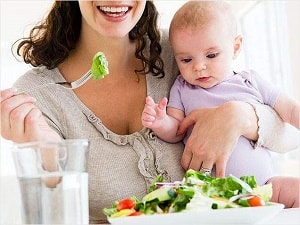Breast milk is the most complete source of nutrients for your new-born infant at least the first six months of his or her life. However what you eat and drink can affect the quality of your milk. Many health experts acknowledged that breast milk plays an important role in producing antibodies specific to the baby’s infection during a baby’s first year of life. Moreover, breast milk contains all the essential nutrients and unique components that cannot be replicated in infant formula. Breastfeeding is the best gift that you can give to your baby, which last a lifetime. Below are some tips to help you produce the best breastmilk possible for your new-born infant.
- Keep Your Body Hydrated
Although drinking more fluids does not increase your breastmilk supply, insufficient water intake could affect your milk production. Your body needs to be adequately hydrated to produce milk. Drink twice the amount of water you would normally , preferably before you feel thirsty, and consume more if your urine appears dark yellow, also drink a glass of water each time you breastfeed your baby. You should also reduce or avoid diuretics that can dry up breastmilk such as tea, coffee, sugary drinks or alcohol.
- Eat More Calories
In general, women who are breastfeeding need an additional 400 to 500 calories a day to ensure they get enough energy to product breastmilk. These calories should be good calories, not food with empty calories that have lots of calories but very few nutrients like vitamins and minerals. such as peanut butter, chocolate, chips or sugar-sweetened drinks like soda.
To get these extra healthy calories, you can opt for nutritious foods such as eggs, raw nuts and seeds, quinoa, salmon fish, wholemeal bread, hummus and tahini. Remember to avoid foods that are high in calories but nutritionally void such as peanut butter, chocolate, chips or sugar-sweetened drinks like soda.
- Calcium Is Key
Getting enough calcium is essential during breastfeeding because calcium is passed-on to your baby through breastmilk, helping them to develop their muscle, bones and neurological system. Studies show that women lose 3 to 5 percent of their bone mass when they are breastfeeding. After you finish breastfeeding, your body must replenish the calcium that was used to produce your milk. The calcium recommendation for breastfeeding women is 1,000 milligrams (mg) per day. Foods that are high in calcium including dates, almonds, seaweed, broccoli ,full fat organic dairy products from cow, goat and sheep, just to name a few.
- Include Good Fats In Your Diet
Babies need fat, both saturated and unsaturated. It is essential for growth, especially for the development of the nervous system and of the brain, which composed of 60 percent fat. Essential fatty acids (EFAs) are particularly important for infant brain development, and a mother’s diet determines the amount and kinds of fat in her milk. Breastfeeding women should consumes more good fats such as cold pressed oils, fish oils, raw nuts and seeds, avocado and coconut milk/cream and eggs to ensure your breast milk contains sufficient amounts of omega-3 and omega-6 essential fatty acids.
- Increase Protein Intake
Protein is another component of a healthy diet that demands your attention while you are breastfeeding. Protein is necessary for healthy milk production and will ensure your baby gets all the essential amino acids for mental and physical growth.
Keep in mind that protein intake requirement during breastfeeding is more than during pregnancy as you lose quite a bit of protein in breastmilk. During breastfeeding, the amount of protein you would need on average is 1.4g/kg of body weight. You can include fish in your weekly diet as one source of protein, especially fatty fish such as salmon, tuna, and mackerel. These types of fish are rich sources of DHA (docosahexaenoic acid), an omega-3 fatty acid that is found in breast milk and contributes to growth and development of an infant’s brain and eyes.
